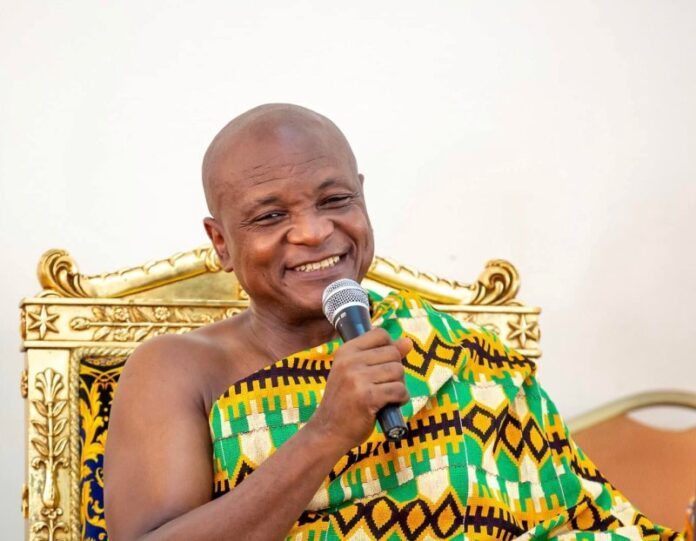Togbe Afede XIV, the Agbogbomefia of the Asogli state has called for the separation of Governorship and Chairmanship at the Bank of Ghana.
“The independence of the Bank of Ghana is a desirable goal. We all agree that this should be the case. This independence is all the more reason for us to have internal checks and balances in place, as well as more transparency, by separating the roles of Chairman and Governor of the Bank of Ghana.”
Togbe Afede XIV made this suggestions when members of Parliament led by Speaker Alban Sumana Kingsford Bagbin called on him during their stay at Ho for their post-budget retreat in the Volta Region. He said it was important to seek improvement in everything to remove lapses for the sake of the future.
- 22 persons, chief arrested over chieftaincy dispute at Awutu Senya West
- Bawumia pays tribute to late former DCE and Chief of Binaba
“Our people are suffering, and our youth are suffering from joblessness. These are threats to our security and our future.
“As I have always said, poverty is not God’s desire for man. That is why the pursuit of happiness is an inalienable human right. Our people deserve to be happy, and it behooves on you and I, as leaders, to work together to ensure that the happiness that our people deserve, can come to be part of their lives. But it would require certain actions from all of us”.
He called for effective planning and management of the economy by reducing interest rates to promote businesses.
“Not since 2003 when I complained about monetary policy in this country has there been any open debate about how monetary policy has been conducted”
He said the country had always been in a high inflation and high interest rate environment, a situation that was thwarting the growth and development of the private sector.
“Private entrepreneurs or enterprises don’t have stacks of money that they just go and dip into to fund their businesses. They have to depend on the banking system. So no amount of your hard work would bring the development that we need when borrowing rates are so high. We want the youth to go into private business, but with what kind of capital? Expensive, highly priced 25% or 30%? Those cannot do it, and we have been victims of this over the years.”
The Business mongul said the scapegoat had always been Government borrowing, the high indebtedness of Government.
“The UK’s debt to GDP ratio is about 104 per cent. Ghana’s is 81 percent. Relatively, we are better. The per capita indebtedness of the UK is $42,000, ours is $1,400. Compared to income per capita, we are much better. Our income per capita is $2,300, that of the UK is $40,000. So UK’s debt per capita, $42,000, is higher than income per capita, $40,000. Our debt per capita $1,400, is much less than our income per capita, $2,300.
“So relatively, the UK is more indebted than Ghana, yet the rate at which the Bank of England lends to banks currently is 0.1 per cent , while Bank of Ghana lends to our banks at 13.5 per cent. That is a whopping one hundred and thirty-five times the Bank of England rate.
“The UK GDP, which reflects the size of the economy, is $2.7trillion, almost 40 times the size of our economy, which is $72billion (GDP). But guess what? Bank of England made a profit of £57million ($76million) in 2020/21, down from £72million ($96million) in 2019/20. Bank of Ghana, on the other hand, made a profit of GHS1.57billion ($270million) in 2020, down from GHS1.8billion ($310million) in 2019. The question is, doing what?!
“Yes, that is the benefit from their 13.5% lending rate. Mr. Speaker, this is where the problem has been, but we don’t seem to know. Bank of Ghana has lost focus, competing with the banks for profits, instead contributing to the macro-economic objectives of stability, growth and employment creation.”
“We cannot be “targeting” inflation by making past inflation the basis for fixing the bank rate. It should be a question of what expectation you have about the inflation, which essentially is the “target”.
“So, Mr. Speaker, in your deliberations, I believe you must examine the inflationary monetary policy that has been our affliction in this country very closely. We require new ideas. “The prime rate has fluctuated between 12.5 and 27.5 percent for nearly two decades. Price and exchange rate volatility cannot be attributed simply to government borrowing.” There’s something wrong, and I’ve shown it using relativities, comparing England and Ghana’s debt to GDP ratios and debt per capita relative to income per capita. I don’t believe we should have to live in such a deplorable climate that suffocates everything and everyone – the government, the private sector, industry, and initiative.”

